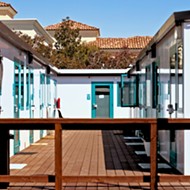[{
"name": "Newsletter Promo",
"id": "NewsletterPromo",
"class": "inlineCenter",
"insertPoint": "4",
"component": "15264767",
"requiredCountToDisplay": "0"
},{
"name": "Ad - Medium Rectangle CC01 - 300x250",
"id": "AdMediumRectangleCC01300x250",
"class": "inlineCenter",
"insertPoint": "8",
"component": "2963441",
"requiredCountToDisplay": "12"
},{
"name": "Ad - Medium Rectangle LC01 - 300x250",
"id": "AdMediumRectangleCC01300x250",
"class": "inlineCenter",
"insertPoint": "18",
"component": "2963441",
"requiredCountToDisplay": "22"
},{
"name": "Ad - Medium Rectangle LC09 - 300x250",
"id": "AdMediumRectangleLC09300x250",
"class": "inlineCenter",
"insertPoint": "28",
"component": "3252660",
"requiredCountToDisplay": "32"
}]
Morro Bay High School officials responded quickly when questions were raised about the safety of the school’s garden during the first week of school last month.
Researcher David Broadwater met with a science teacher at the school after an Aug. 13 article in New Times revealed that some of the raised beds where vegetables are grown had been filled with composted sewage sludge donated by the Morro Bay Wastewater Treatment Plant. Broadwater, who runs the Center for Sludge Information in Atascadero, cited research about heavy metals and pathogens in composted sludge.
Superintendent Ed Valentine of San Luis Coastal School District told New Times that officials decided to remove the material and take it back to the wastewater plant up the road during the weekend of the first week of school.
“This was a perfectly well-intentioned project involving the school garden and a donation of fertilizer that at the time everyone believed was fine for the re-nutrition of soil. Then we found out later about what substances are in it, and the questions about it. We thought, “Till the controversy is settled, why not stay away from it?’ So we replaced it with new soil,” Valentine said.
“To the extent that there are questions, we’re not going to use our school garden to find answers,” he noted, adding that he is “totally” a supporter of school gardens.
The San Luis Coastal school board also discussed the issue at a meeting earlier this month, after Broadwater spoke. Many of the schools in the district have school gardens, mostly using “self-generated compost” and traditional sources for soil mixes, according to Valentine. Morro Bay High’s garden was “more cutting edge,” he noted. Plant growth rates in 100 percent composted sewage sludge were compared to plants grown in half topsoil, half sludge compost.
Broadwater also presented a packet of information about heavy metals and other chemicals in sludge to the SLO County Health Commission at its meeting Sept. 14. After another agenda item covered the health impacts from breathing tiny particulates in polluted air, commission Chair Pam Heatherington asked whether sludge produces unhealthy airborne particles.
After the health commission meeting, Broadwater said he did some research on the issue and wrote a short report for commissioners, citing concerns about heavy metals, fungus, and bacterial pathogens that can cause respiratory illnesses
Latest in News
Readers also liked…
-

Coast Unified teachers upset over new position's salary and qualifications
Oct 20, 2022 -

SLO police identify alleged driver who hit and killed couple
Dec 22, 2022 -

When the levee breaks: Oceano residents, county officials walk a tightrope of regulations to manage Arroyo Grande Creek, which some say led to the levee's failure in January
May 18, 2023








